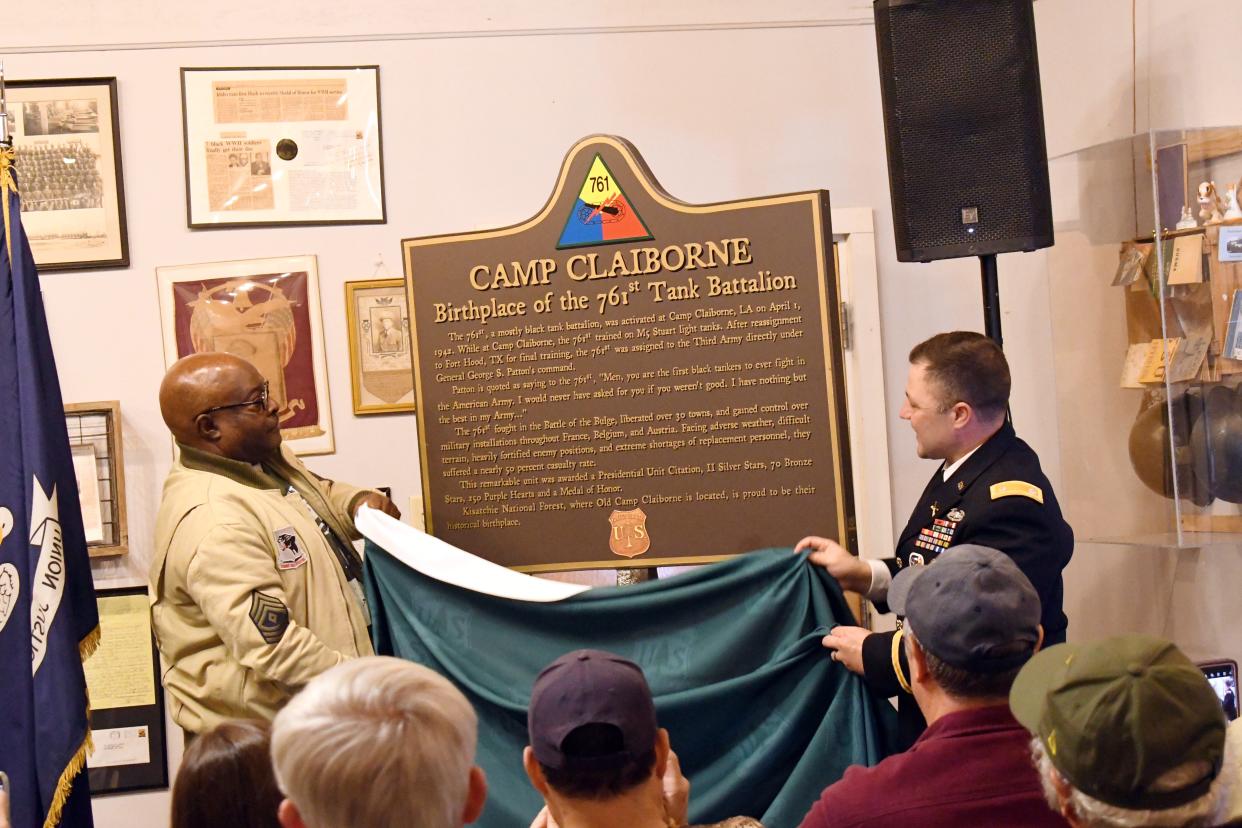Marker honors Black soldiers of the 761st from Camp Claiborne who fought in World War II

Clinton Warren gazed at the historical marker commemorating the 761st Battalion, known as the Black Panthers. His mission to have the Black soldiers of this historic battalion honored for their service has been accomplished.
“I can’t let you see it but I have tears. It’s a great day to honor these men and what they did,” he told an audience Thursday at the Southern Forest Heritage Museum in Longleaf.
The marker was supposed to be unveiled at the flagpole where the headquarters of the Old Camp Claiborne used to be. But the Kisatchie Forest Service, which hosted the ceremony and oversees the former military installation because it is part of the Kisatchie National Forest, moved the ceremony to the museum.
“My journey with this plaque, believe it or not, started in 1979. I was little young soldier stationed in Germany on the Hof Border guarding the border between Germany and Czechoslovakia,” said Warren, a 24-year Army veteran, standing in a room surrounded by World War II artifacts.
A German, he recalled, asked him, “Were you ever a schwarz panther soldat?”
Warren told him that he was an infantry soldier. Then the German told him the story about the Black tankers, the soldiers of the 761st Battalion, and how they helped liberate cities and concentration camps during World War II.
So he started to learn about them. As a young, Black soldier, he said he found inspiration in their story.
An information kiosk states states the 761st Battalion was known as the Black Panthers. It was activated at Camp Claiborne in 1942 serving under the command of the 5th Tank Group.
More local news:Central Louisiana students will soon have a new resource to pursue health care careers
State news:Louisiana passes emergency bill to address insurance crisis: Will it work?
“The unit trained in M5 Stuart light tanks where they learned how to maneuver, mount, dismount and maintain the vehicle’s 37 mm main gun and .30-caliber machine guns,” according to the kiosk.
“And believe it or not, most of those soldiers who were in those tanks, that I learned later on in Germany, they used to call them ‘Buffalo Soldiers wrapped in steel.’ Because most of those soldiers came from Fort Riley when they took away their horses,” Warren said.
Back then, the U.S. Army was still segregated and the 761st trained amid racial tensions of the Jim Crow South, said Lt. Col. Jon Chavous of Fort Polk.
The soldiers at Camp Claiborne were among the 400,000 troops training in Central Louisiana for World War II in what were known as the Louisiana Maneuvers.
The 761st was given extended training at Camp Hood in Texas because Army commanders didn’t want to give Black troops the chance to prove themselves in combat. But the extra training proved invaluable when they engaged the Germans, Chavous said.
“Once on the battlefields of Europe, the 761st set out to prove that they were just as good if not better than their white comrades,” he said.
In 1944, Gen. George S. Patton requested that the 761st be assigned to his command of the 3rd Army in Europe.
“Soldiers of the 761st fought through France, often at the leading edge of the advance. The unit endured 183 days of continuous operational involvement. In the final days of the war in Europe, the 761st was one of the first American units to reach the Steyr River in Austria,” states the information kiosk.
The 761st fought in the Battle of the Bulge, liberated over 30 towns and gained control of military bases in France, Belgium and Austria, all while “facing adverse weather conditions, difficult terrain, heavily fortified enemy positions, and extreme shortage of replacement personnel,” the marker says. The battalion's casualty rate was nearly 50%.
The unit earned a Presidential Unit Citation, 11 Silver Stars, 70 Bronze Stars and 250 purple hearts, said Chavous. In 1997, Staff Sgt. Ruben Rivers was posthumously awarded the Medal of Honor for extraordinary heroism, Nov. 16-19, 1944.
Warren said he never visited the Old Camp Claiborne site during the years he was stationed at Fort Polk. But when he finally did, he only saw information kiosks that said it was the Birthplace of the 82ne Airborne and the 101st Airborne Divisions but he found nothing that mentioned the 761st Tank Battalion.
That’s when he decided that something had to be done to commemorate the 761st “because the world needs to know about these guys and what they went through.”
It was with the help of a lot of people that this marker came about, Warren said.
The 761st fought not only to defeat the Nazis but also racism in the United States.
“The heroic actions of the men assigned to the 761st changed how many people thought about Black Americans and was a milestone in desegregation of the American military and a precursor to Civil Rights Movement of the 1960s,” Chavous said. “The recognition is long overdue and well deserved.”
This article originally appeared on Alexandria Town Talk: Marker honors Black soldiers of the 761st who fought in World War II

